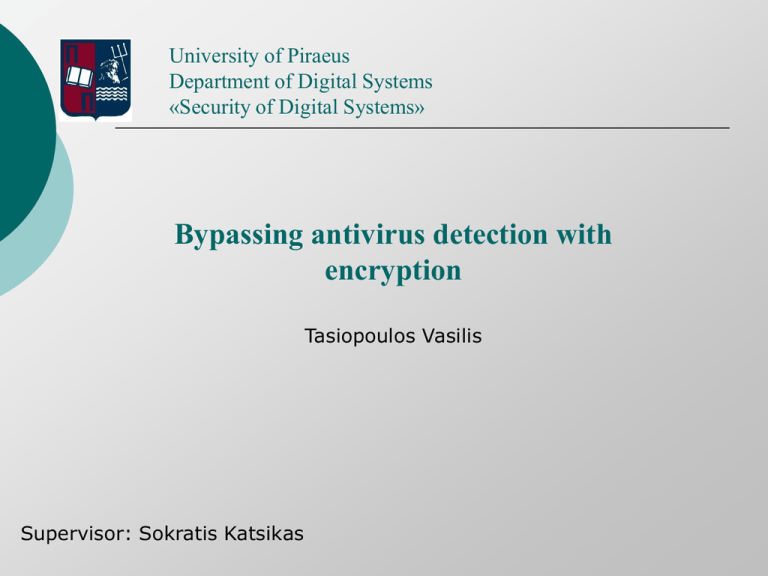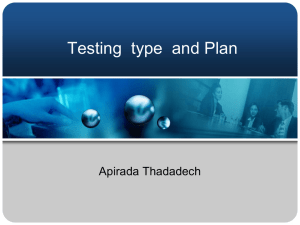Bypassing Antivirus Detection with Encryption
advertisement

University of Piraeus Department of Digital Systems «Security of Digital Systems» Bypassing antivirus detection with encryption Tasiopoulos Vasilis Supervisor: Sokratis Katsikas About Me Studied at University of Piraeus Informatics Security in Digital Systems Currently working KPMG as a IT Advisor and Penetration tester Contents Related Research Background Knowledge-Antivirus Crypter Background Knowledge-Portable executable Background Knowledge-Portable Executable Loader RunPE and Injection Our Implementation Results Why? It is easier to change crypter It is harder to change ALL malwares Who can use it: Penetration Tests Anyone for Legitimate purpose Related Research Implementation of Runtime Crypter by Christian Ammann Packing Heat by Dimitrios A. Glynos The Crypter BluePrint by crypters.net Several tutorial on HackForums.net Background Knowledge - Antivirus Signature-based detection: Traditionally, antivirus software heavily relied on signatures to identify malware. Heuristics: Another technique used in antivirus software is the use of heuristic analysis to identify new malware or variants of known malware. Real-time protection: Newer antivirus software also has another mechanism called “real time” protection. It is known that some (malicious) code may be hidden, encrypted, obfuscated or even created instantly. To be able to deal with such tricks antivirus packages are also capable of monitoring and intercepting API calls and of performing a kind of "behavioral analysis". So, if a well-known process acts in an unusual manner the antivirus will mark it as suspicious. Crypters: Types and behavior Types: • Runtime • Scantime Options • Internal Stub • External Stub Crypter must: • Encrypt Crypter’s behavior Stub must: • Decrypt • Execute malware Stub options: • Save in directory • Load it in memory • Load it in stub’s process • Load in new process • Inject into another process (optimal) RunPE and Injection Method discovered by T.keong Injection: The stub is executed A new process is created in "suspended" state The Stub decrypts the malware The stub load the malware in the place of the suspended legitimate process The process is unsuspended. Limitation: 32 bit process or 64 bit process Not in both Different Implementations: Alternative way to call Apis Use of undocumented Apis Our Implementation Crypter’s Type Runtime Crypter External Stub Developed C# Visual Studio 2500 lines of code Encryption AES Architecture 1. User Selects the malware 11. Adding Hide code to stub (optional) 3. Crypter reads the malware byte per byte 4. Encrypting malware 5. Crypter reads the Stub 13. 14. 15. 16. 17. 2. User configures the available options (optional) 12. Removing comments from stub Adding Fake message to stub (optional) Adding Junk Code to stub (optional) Adding Fake Apis to stub (optional) Add decompression code to stub (optional) Adding Addi-… code to stub (optional) 18. Randomizing class, function, 7. Encrypting injection path variable names and add them to 8. Adding injection process path to stub stub and to RunPE 9. Reading selected RunPE 19. Adding Encryption Key to stub 6. Adding assembly info to stub (optional) 10. Adding startup code to stub (optional) Architecture 20. Compiling RunPE as DLL 21. Reading DLL 22. Encrypting DLL 23. Compressing encrypted DLL(optional) 24. Adding encrypted Malware and DLL ass resources to stub 25. Adding Icon to stub(optional) 26. Compiling Stub as executable 27. Adding Eof data to executable (optional) Architecture Stub after execution: Read Encrypted DLL Decrypt DLL Load DLL in memory Read Encrypted malware Decrypt malware Call DLL for decrypted malware Malware inject to another process Architecture Key Points Unique code Injection implemented in encrypted DLL Random Function Names, Class names, Variable names Encrypted Strings Result: Unique Executable Crypters GUI and Options Crypters GUI and Options Crypters GUI and Options Results The lab: Windows XP 32/64 bit - Avast/AVG Windows Vista 32/64 bit – Kaspersky/Norton Windows 7 32/64 bit –Microsoft Security Essential/ESET Online Scanner http://nodistribute.com https://www.metascan-online.com Files Tested Netcat.exe Darkomet malware Poison Ivy Results Virus Injection Method Windows Version RunPE Choice Working Darkcomet CSC 32bit 3 YES 0/40 Darkcomet CSC 64bit 3 YES 0/40 Darkcomet CSC 32bit 2 YES 0/40 Darkcomet CSC 64bit 2 YES 0/40 Darkcomet CSC 32bit 5 YES 0/40 Darkcomet CSC 64bit 5 YES 0/40 Darkcomet CSC 32bit 6 YES 0/40 Darkcomet CSC 64bit 6 YES 0/40 Darkcomet Default Browser 32bit 5 YES 0/40 Mozilla Darkcomet Default Browser 64bit 5 YES 0/40 Mozilla/Chrome Darkcomet Default Browser 32bit 5 YES 0/40 Internet explorer Darkcomet Default Browser 64bit 5 YES 0/40 Internet explorer Darkcomet svchost 32bit 5 YES 0/40 Darkcomet svchost 64bit 5 YES 0/40 Detection Notes







